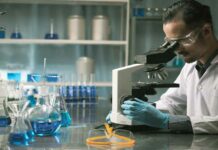Oxford Optronix, the leading provider of advanced research instrumentation for the clinical medicine and life science industries, today announces the formal launch of HypoxyLab™ – the industry’s first benchtop, HEPA-filtered, precision-controlled hypoxia workstation.
HypoxyLab creates optimal, contamination-free conditions for a wide variety of cell-based research fields, including cancer biology, radiation cell biology, cardiovascular research, apoptosis, neurology, stem cell research, multidisciplinary drug development and proteomics.
HypoxyLab is a unique, fully-featured and easy-to-use hypoxia workstation that accurately reproduces physiological conditions for cell-based research. HypoxyLab provides a highly stable, localised environment in which levels of oxygen, carbon dioxide, temperature and humidity are precisely controlled within a HEPA-filtered isolation work chamber.
Using the optional OxyLite™ module, HypoxyLab also uniquely offers support for direct oxygen partial pressure (pO2) measurements from cell media or tissue using fibre-optic sensors. The ergonomically-designed benchtop workstation maintains ultra-stable climatic conditions using processor-controlled temperature and the latest nebulizer-based, humidifier technology – delivering requisite levels of humidity whilst maintaining a Class 5 environment.
Precision concentrations of O2 and CO2 as well as chamber temperature and humidity are controlled via a colour touch-screen display and delivered using unique, electronic gas flow controllers and auto-calibrating, state-of-the-art sensors. The workstation displays real-time values of chamber O2, CO2, Temperature and Humidity on the touch-screen and simultaneously records this information onto a USB memory stick for off-line analysis. HypoxyLab’s highly optimised working volume ensures ultra-rapid cell cycling and tissue response times, whilst precise oxygen profiling and cycling is controlled via the intuitive graphical user interface. This allows researchers to easily create any number of bespoke oxygen profiling patterns.
In tissue culture technology, there is a growing need for systems capable of creating precise and reproducible mammalian cell environments – now recognised as vital for accurate analysis of both cell metabolism and cell function. However, a significant proportion of cell biology research is still performed in ‘traditional incubators’, in which cells are routinely exposed to the oxygen values found in air – at least two or three times the value expected in normal tissues – leading to cellular stress, significant physiological changes which influence differentiation, growth factor signaling and other cellular processes including post-translational metabolic pathways.
By delivering a contamination-free environment that offers precise and continuous control of O2, CO2, temperature and humidity, Oxford Optronix’s new HypoxyLab workstation delivers a powerful new solution to research teams looking to accurately reproduce real-life physiological conditions in cell-based research.
Commenting on the launch, Andy Obeid PhD, CEO of Oxford Optronix said: “With the growing industry-wide recognition of the need to create physiologically reproducible, low oxygen and hypoxic environments for mammalian cells in the laboratory, we were determined to create a solution for our customers that combines cost-effectiveness and a small form factor with unrivalled accuracy and precision. Our new HypoxyLab is easy to use, economic to run and delivers the industry’s first benchtop, HEPA-filtered hypoxia workstation with applicability for every cell-based research laboratory.”




















